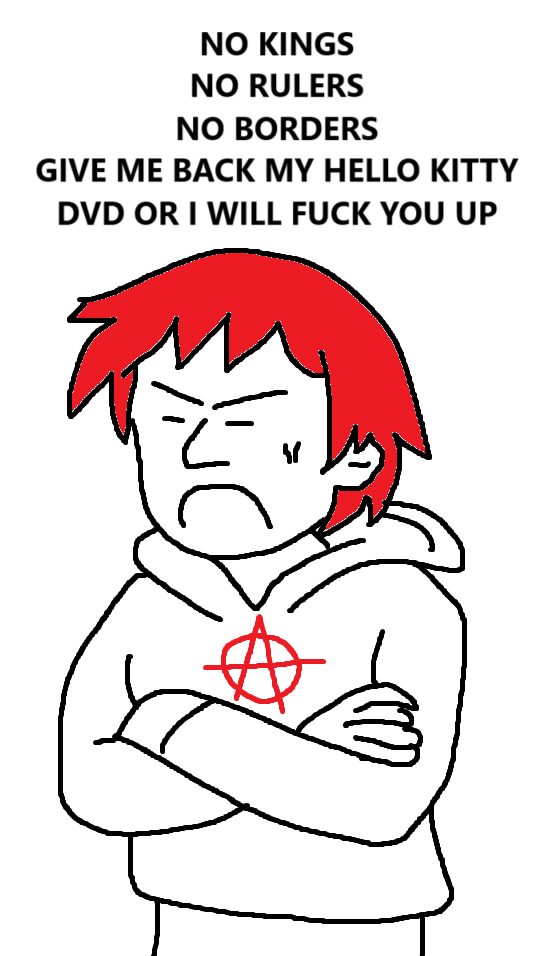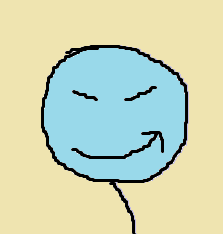[dude with glasses in a communist t-shirt, arguing] I’m the only leftist here, your opinions are TRASH
[dude holding a theory book on smug, arguing] Read theory you losers, you’re all WRONG
[dude in an anarchist hoodie, arguing] Nuh-uh, I’m the only leftist here, you’re SHITLIBS
[the three dudes are now caught in a cartoon fight, glasses gone flying, punches everywhere, while a firing squad of nazis are targeting them with rifles]
[a confused nazi asks] Why… why are they still arguing?



If your stance is that administration and managers are incompatible with socialism, and that democratically elected representatives are not a genuine form of democracy for the people, then your stance is that Marxism in general isn’t socialist to begin with. I think this is more of a semantical argument than a moral or logical one, if I ceded that Marxism isn’t socialist by your definition that says nothing about whether or not Marxism is a sound framework and that Marxist “socialism” is something worth pursuing.
Further, I don’t see how you could have large-scale society while requiring every decision to be made collectively, so either you’re pushing for the small-scale commune model with individual or small cooperative production, or there’s something else you agree with that I’m not aware of. Most anarchists recognize “justified” hierarchies of some sort to get around this issue, usually with different models like participatory economics, but I do understand that the maximally horizontalist anarchists do also exist.
As for how decisionmaking is made in the PRC, it depends on the scale. Much of the larger decisions are made centrally at the level of the NPC, but local decisions are often made directly through township councils or regional councils. It works well for its people, which is why it gets such widespread support.
i did ask who makes the big decisions and decides “the course of the country”. i agree that if the entire populace were to decide every minor detail, it would become inoperably slow.
i make a distinction between ceding all power and decisions to a representative every voting cycle (5 years for the NPC?) vs. choosing a delegate who enacts decisions made by the populace, and has decision-making power of their own in the confines of the mandate they were given by the people, and who is directly recallable at any time by a simple majority.
this attemps to give decision-making power to everyone affected by a decision, without giving it to those unaffected and slowing the process down.
whereas the state reduces the power of the individual to a decision of “1, 2, or 3” every 5 years or so, followed by all other decisions being made by their new ruler.
my argument is that the representative model does not give meaningful enough control to the people to consider this “state” an extension of the people.
i would define socialism as public ownership of the means of production. where “public” means “of the people” and ownership means “having meaningful control of”.
so in my view, until the people meaningfully control the state or the means of production, it is not socialism.
The PRC generally follows the latter model you describe. Recall elections are possible, and there are different “rungs” that are directly accountable to lower rungs. Politicians have to work their way up the rungs in order to increase their scope of decisionmaking, if they break that trust they fall back down the ladder. Part of Xi Jinping’s campaign that brought him immense popularity among the people was purging of opportunists that held comfortable positions throughout the 90s and 2000s.
Going back to the “rung” model, there are townships, county, provincial, and central governments. Townships are the lowest level and most direct, and each county is made up of many townships, each province many counties, and all provinces under central. This direct line from bottom to top means the legitimacy at the top is laddered upward, while allowing those who have proven themselves to operate from the top back downward. Their legitimacy and accountability is maintained through that unbroken chain.
I would say that, based on my previous paragraphs and answers, the PRC absolutely qualifies. I think if we are merely disagreeing about vibes, then we are abstracting away from the material base in a way that is counter-productive to discussion.
i think u misunderstand the delegate model i described.
what youre describing is a hierarchical system where the higher up the “rungs” u go, the larger the scope of decisions u can make.
whereas in the delegate model, the maximum scope of decisions is always directly with the people (who could make any decision independently of delegates, if they want to), and every delegate has decision-making power smaller than that scope, meaning the scope of possible actions decreases rather than increases.
Hierarchy isn’t something antihetical to socialism, it exists in all systems. Further, I still don’t really see how this model handles global systems of production and supply chains, and further still, I think you’re just redefining socialism to only include anarchism, which is a semantical argument and not a logical one.
as a communist, i believe there is such a thing as a non-hierarchical system.
further, i dont really see how the PRC will ever achieve communism or socialism and further still, i think you are redefining socialism to include china, which is a semantical argument and not a logical one.
Communism is generally held to be about class and state abolition, not hierarchy in general. Delegates in your model still have hierarchy, what’s important is accountability and that the general interest is upheld. As for the PRC, it’s already socialist, the large firms and key industries are publicly owned. It certainly isn’t anarchist, nor is it a stateless, classless, moneyless, global society, but it’s socialist.
which are hierarchies, and the criticism of these are based on the same root issue that all hierarchies have. i admit that this statement was somewhat inflammatory, altho i firmly believe that anarchism is the natural conclusion of the communist idea.
no. the power is always among the people who choose the delegate, formulate their mandate, and can recall them at any time. the delegate has no power over the people, nor is the delegate coerced into their role.
and u can call the PRC socialist all u like, but that still dont make it true.
Inter-class hierarchy exists, ie bourgeois and proletarian, but intra-class hierarchy also exists, ie worker and manager. The Marxist critique of class involves the fact that there’s hierarchy, but that’s not the focus, the focus is on class as a social relation to production as informed by ownership. I’m more than willing to agree that your critique is the general anarchist critique, and I’m okay with you preferring anarchism, I just think that if you’re trying to argue that Marxism isn’t a communist ideology because it doesn’t hold the same view of hierarchy as anarchism does, that that’s a bit myopic.
Just because the delegate was elected and is subject to recall doesn’t mean it isn’t a hierarchy, though. Unless your point is that the delegate can only do what 100% of those who elected them want, and if any oppose them then they have no power, but in that case everything would collapse to a halt. The PRC has delegates and elections, and recall elections too, so I’m not sure I understand your criticism with that.
As for not considering the PRC socialist, are you saying it doesn’t fit the anarchist conception of socialism, or the conception of socialism that includes Marxism as socialist? Ie, is your argument that the PRC does not meet the Marxist understanding of socialism as well as the anarchist? This is something that needs heavy judtification if so, but if you just mean the anarchist conception then I agree, the PRC isn’t anarchist and isn’t pretending to be.